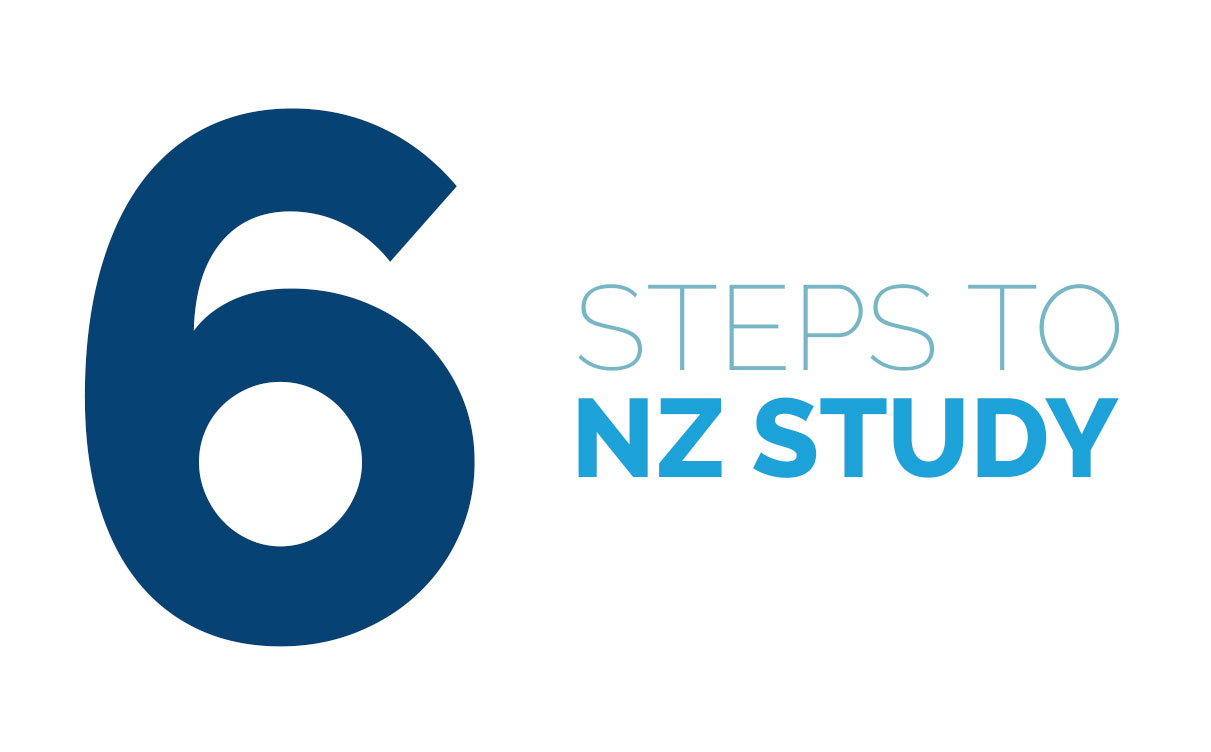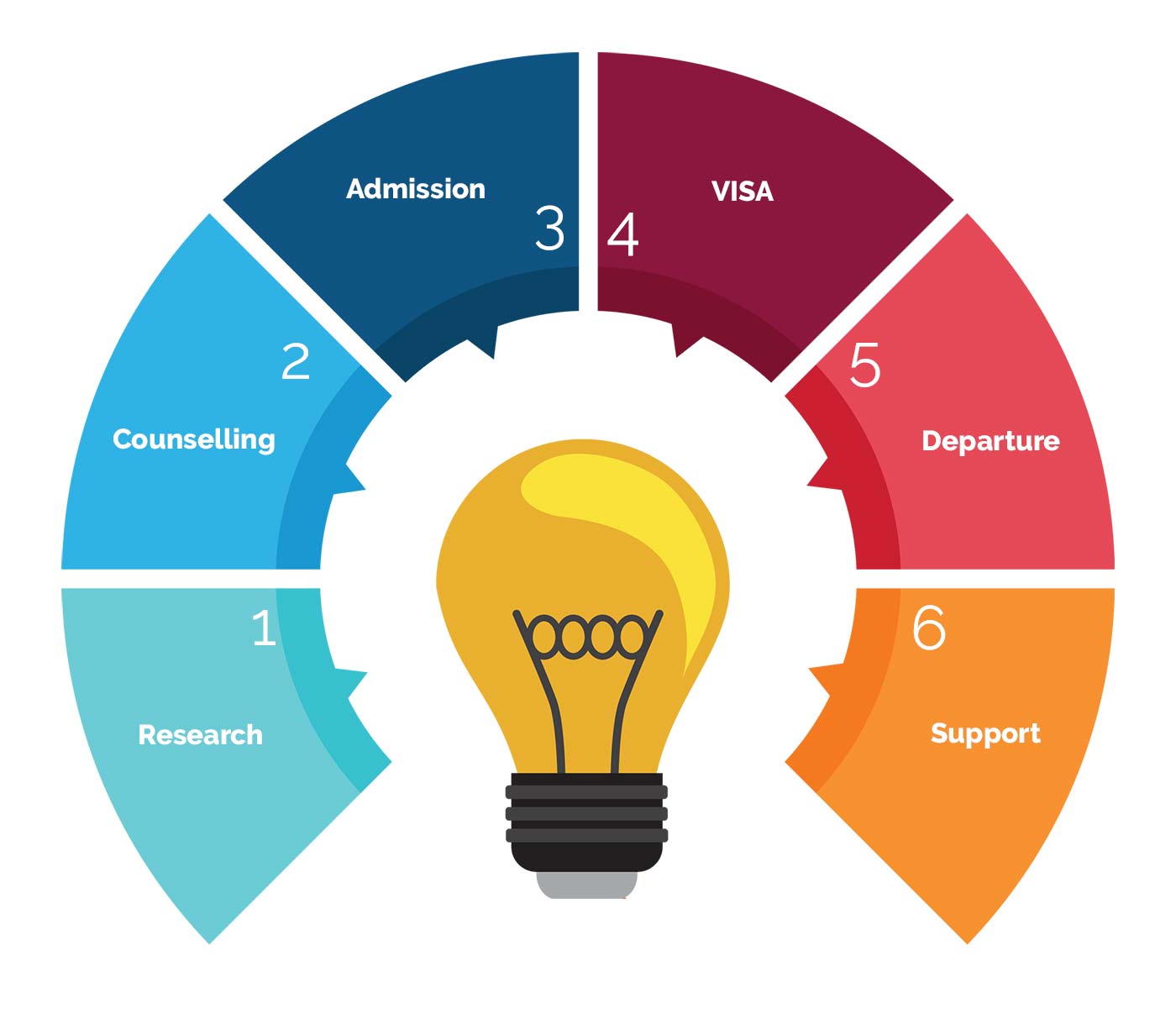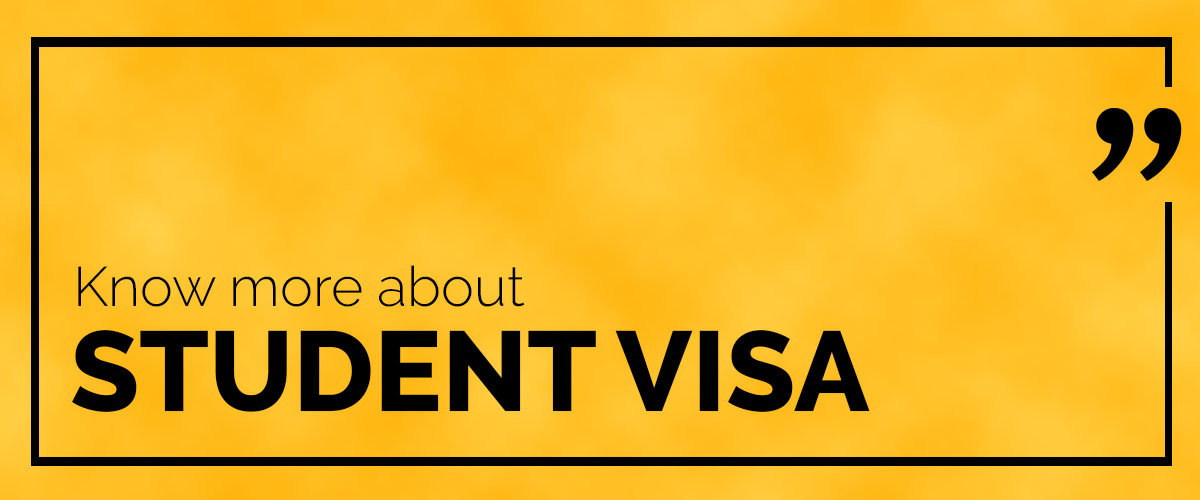

Step 1
Research all your options
Compare career opportunities derived from specific coursesLearn about a variety of universities and colleges to suit your background & finance
Step 2
Meet the GEC counselor
Our education counselors will study and evaluate all the possible study options for you based on your academic background, aspiration, budget, eligibility, work experience, etc.Step 3
Complete your application
Your GEC counselor will help you fill in the required forms; critique the statement of purpose and recommendation letters. Additionally, you will always be briefed with the latest news and information about visa requirements from the official sourcesStep 4
Application for visa
Your GEC counselor will guide you through the required documents for visa and lodge your application with the immigration departmentStep 5
Get ready for your departure
Our pre-departure session includes vital information from immigration compliance to what all you need to study and live in New ZealandStep 6
Ongoing support
You can always get in touch for any sort of guidance after reaching. If you would like to change your course, we are only one call awayUniversities
Polytechnics
Students Recruited

World-class education
NZ prides itself on offering a world-class education to students. All eight of New Zealand universities are in the top 3% in the world. They are known for leading the way through academic excellence and personalized learning.
Student safety
According to Global Peace Index, 2017, New Zealand is rated as the second most peaceful country. It is a politically stable and peaceful country with the least rates of corruption compared to the world.

Impeccable lifestyle
New Zealand is blessed as a natural abode. Students find no difficulties in maintaining work/life balance. It is a country worth exploring for all possible natural adventures to soothe away the busy and hustling life pressure.
Teaching method
NZ institutions focus on improving students’ critical thinking. By this teaching approach, they believe in creating the future leaders. Their academic courses are designed to encourage practicality and hands-on learning.
Welcoming community
New Zealanders are welcoming and respectful of others culture. Every city is an epitome of multiculturalism.

New Zealand education system mirrors the British-based erudition system that is recognized worldwide. This model facilitates the student mobility on choice between institutes of New Zealand and other English-speaking countries during their studies. Both international and domestic students share classrooms together and are encouraged to actively participate to gain learning of various facets in their courses. The internationalization of teaching offers the collaborative learning between both types of students. Universities and colleges are well-equipped with offering competitive degrees on broad fields of study. The Government of New Zealand better understands the value of international education and its positive impact on various dimensions.
Work rights for international students
International students are authorized to work part-time up to 20 hours a week while studying or full-time in the holidays, depending upon your visa conditions. They cannot work until they have commenced their course in New Zealand.
Visa Requirements
Your GEC counselor will explain you about visa requirements for your New Zealand application.
In order to succeed in your student visa application, you must demonstrate your genuine intent to study, have enough financial support to pay your tuition fees, maintenance expenses and air tariff.
Apart from these basic visa requirements set out by the New Zealand Immigration department, you may also need following documents/evidence:
Offer Letter
Your university/ITP/college will issue an offer letter which depicts your full name, DoB/Passport Number, student ID, name of the course, length, concentration (discipline),title of degree, full-time status, and tuition fees
Health and medical checks
You will need to have a chest x-ray and/or a medical examination as proof of your good health.
Travel Insurance
Travel insurance is mandatory for international students for the entire period of their stay on a student visa.
Guarantee of Stay for Minors (less than 18 years)
An undertaking from a person or an institution stating that the student has suitable accommodation arranged in New Zealand.
Proof of Language Proficiency Certificate
The IELTS mark card is one of the prerequisites for New Zealand schools and Immigration Department.

Universities
Fast facts about universities
- There are 8 universities
- All universities are ranked among the world’s best by QS World University Rankings
- Universities are state funded
- New Zealand government agencies monitor the quality of education
- They offer courses right from certificate level to doctorate level
- They are research based – both applied and basic
- The academic course commences in March and ends in November
- Some have mid-year intakes (July) also
List of New Zealand Universities
- The University of Auckland
- Auckland University of Technology
- Lincoln University
- Victoria University of Wellington
- Massey University
- The University of Waikato
- University of Canterbury
- University of Otago
Fast facts about Institute of Technology and Polytechnics (ITPs)
- There are 16 ITPs
- ITPs are state funded
- All ITPs offer high-quality qualifications and training focused on hands-on experience and practical skills
- Over 157,000 students gain qualifications in all kinds of industries
- ITPs teach in facilities that are based on real-world situations and workplaces
- Courses are shaped by industry
- The lecturers at ITPs possess relevant industry experience
List of ITPs
- Ara Institute of Canterbury (ARA)
- Eastern Institute of Technology (Hawkes Bay) (EIT)
- Mankau Institute of Technology
- Nelson Marlborough Institute of Technology (NMIT)
- Northland Polytechnic (North Tec)
- Otago Polytechnic
- Southern Institute of Technology (SIT)
- Tai Poutini Polytechnic
- The Open Polytechnic of New Zealand
- Unitec New Zealand
- Universal College of Learning (UCOL)
- Toi Ohomai Institute of Technology
- Waikato Institute of Technology (Wintec)
- Wellington Institute of Technology (Weltec)
- Western Institute of Technology at Taranaki (WITT)
- Whitireia Community Polytechnic
Fast facts about Private Training Providers (PTEs)
- There are several PTEs across New Zealand
- Qualifications are recognized globally
- They offer practical courses for all levels of study, from foundation courses right through to masters degree
- They offer tailored learning and flexible pathways
- Smaller classroom sizes
- Degree offered are recognized and monitored by New Zealand Qualification Authority (NZQA)
List of PTEs
- http://www.nzqa.govt.nz/providers-partners/education-code-of-practice/signatories-to-the-code-of-practice/ptes/
New Zealand Qualifications and their levels
10 |
Doctorates |
|
9 |
Master’s Degree |
|
8 |
Postgraduate Diplomas and Certificates |
Bachelor’s Degrees with Honours |
7 |
Graduate Diplomas and Certificates |
Bachelor’s Degree |
6 |
Certificates |
Diplomas |
5 |
Certificates |
Diplomas |
4 |
Certificates |
|
3 |
Certificates |
NCEA Level 3 |
2 |
Certificates |
NCEA Level 2 |
1 |
Certificates |
NCEA Level 1 |
Cost of studying

Studying New Zealand is as expensive as studying in any OECD countries. Tuition fees for international students vary considerably depending upon the type of course, the length of program and the location.
New Zealand Immigration Department puts a specific figure on the costs of international students. You must provide evidence that you can cover your living expenses while you are studying in New Zealand. You will need to demonstrate that you have at least NZ$15,000 to support your education trip. On top of it, upon receiving the Approval-in-Principal (AIP) from New Zealand Immigration Department, you will need to wire (or need to send the banker’s check of tuition fees) the tuition fees for the first year. Please note unlike other OECD countries as education destinations, the government of New Zealand mandates you to pay a one-year upfront tuition fee.
According to New Zealand Education, the official government website for international students, typical annual fees for international students are:
- Bachelor’s degree - From NZ$22,000 to NZ$32,000
- Master’s degree - From NZ$26,000 to NZ$37,000
- Doctoral degree - From NZ$6,500 to NZ$9,000

Health insurance is a requirement of the Ministry of Education’s Code of Practice. International student visa holders are generally not eligible to access the publicly funded health and disability services.
Your course provider usually arranges your insurance policy on your behalf, and the amount of premium is added to your cost sheet of the estimated tuition fees. Overseas health coverage is compulsory for all international students.
Visa Requirements
Your GEC counselor will explain you about visa requirements for your New Zealand application.
In order to succeed in your student visa application, you must demonstrate your genuine intent to study, have enough financial support to pay your tuition fees, maintenance expenses and air tariff.
Apart from these basic visa requirements set out by the New Zealand Immigration department, you may also need following documents/evidence:
Offer Letter:Your university/ITP/college will issue an offer letter which depicts your full name, DoB/Passport Number, student ID, name of the course, length, concentration (discipline),title of degree, full-time status, and tuition fees
Health and medical checks:You will need to have a chest x-ray and/or a medical examination as proof of your good health.
Travel Insurance:Travel insurance is mandatory for international students for the entire period of their stay on a student visa.
Guarantee of Stay for Minors (less than 18 years):An undertaking from a person or an institution stating that the student has suitable accommodation arranged in New Zealand.
Proof of Language Proficiency Certificate:The IELTS mark card is one of the prerequisites for New Zealand schools and Immigration Department.
For more information about New Zealand student visa, Click here

Scholarships help students reduce their financial expenses for studying along with a sense of achievement and a sense of endorsement of their achievements. There are a range of scholarships available for international students wishing to study at New Zealand schools. To obtain a scholarship, you need to meet the certain scholarship criteria laid down by the specific New Zealand institution. Criteria may vary from university to university and hence check the individual website of institution. However, certain basic such as mentioned below remain constant for all countries.
- Area of study
- Nationality
- Academic excellence (past and ongoing)
- Achievement
- Government’s grant for specific area of studies and nationality
- Financial need
- Quality of leadership
- Essay writing
- Community involvement or service
- Gender (certain scholarships are available for male or female)
Employment

Country overview
The main industries in New Zealand are tourism, mining, machinery and transportation equipment, manufacturing, construction, agriculture, food processing and finance with the GDP of US$186.4 billion in 2017. The economy works on free market principles and is open for foreign direct investment.
By numbers
GDP contributors as on March 2015
|
NZD (millions)
|
% of total |
Rental, Hiring and Real Estate Services |
25,343 |
12.7 |
Manufacturing |
23,970 |
12.0 |
Professional, Scientific, Technical, Administrative and Support |
20,120 |
10.1 |
Retail Trade and Accommodation |
14,654 |
7.3 |
Construction |
14,386 |
7.2 |
Health Care and Social Assistance |
13,426 |
6.7 |
Financial and Insurance Services |
12,612 |
6.3 |
Agriculture, Forestry and Fishing |
12,240 |
6.1 |
Wholesale Trade |
11,156 |
5.6 |
Education and Training |
9,410 |
4.7 |
Public Administration and Safety |
9,352 |
4.7 |
Transport, Postal and Warehousing |
9,235 |
4.6 |
Arts, Recreation and Other Services |
7,191 |
3.6 |
Information Media and Telecommunications |
6,854 |
3.4 |
Electricity, Gas, Water and Waste Services |
6,186 |
3.1 |
Mining |
3,654 |
1.8 |
Gross Domestic Product (GDP) |
199,789 |
100.0 |
Source: New Zealand Immigration, New Zealand Now
Some skills are chronically short supply. Immigration New Zealand regularly updates the list of skill shortages. Currently, the below-mentioned skills fall under immediate or long term shortages:
|
Long Term shortages |
Immediate shortages |
Agriculture and Forestry |
● |
● |
Construction |
● |
● |
Education |
|
● |
Engineering |
● |
● |
Finance/business |
● |
|
Health and social services |
● |
● |
ICT and electronics |
● |
|
Oil and gas |
|
● |
Recreation, hospitality & tourism |
● |
● |
Science |
● |
● |
Trades |
● |
● |
Transport |
● |
|
For more detailed information about both long term shortage skills and immediate shortage skills, please click the official website of Immigration New Zealand: Click Here
There is acute shortage of skilled personnel in various sectors in New Zealand. Students have an opportunity to network with people from various industries and also have a chance to build their rapport by working part time legally while they study. Some courses also offer internships which can be best used as a tool to develop relationship with employers. Students with the skills in demand and education can stay in New Zealand by applying for a Skilled Migrant visa.
Earn while you study
Immigration New Zealand authorizes international students to work part time i.e. 20 hours weekly while their study is in session. To qualify for a part-time work permit, the student must be enrolled for the course which has at least one year length. The part-time job can certainly help you reduce the education expense burden to some extent.
Post study work permit
Graduates with skills in demand are wanted in various industries in New Zealand. There exist many jobs which are classified under long term and immediate shortage skills. The industries which experience the acute need of skilled employees are tourism, mining, machinery and transportation equipment, manufacturing, construction, agriculture, food processing and finance.
Immigration New Zealand gives one-year post study search visa to all international students. Those who wish to live permanently in New Zealand can apply for a Skilled Migrant visa by meeting other immigration factors.
Disclaimer: The government of New Zealand does not guarantee international students the permanent residency.














